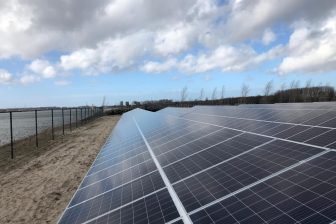COP21 – Somberheid: ‘Temperatuurstijging al door 1°-grens heen’
10 november 2015 – Het Britse Met Office (te vergelijken met ons KNMI) meldde gisteren bij de BBC dat de temperatuur op de wereld al meer dan één graad gestegen zou zijn. The world would then be half way towards 2C, the gateway to dangerous warming.’
Het jaar 2015 gaat door de grens van 1 graad heen. ‘This is the first time we’re set to reach the 1C marker and it’s clear that it is human influence driving our modern climate into uncharted territory” zegt professor Stephen Belcher van het Met Office.
Uit het bericht van de BBC gisteren
‘(…) The Met Office use an average of the temperatures recorded between 1850 and 1900, which they argue makes their analysis more accurate. Their latest temperature information comes from a dataset jointly run by the Met Office and the Climatic Research Unit at the University of East Anglia.
The HadCRUT database showed that in the first nine months of this year, the global mean temperature had just gone above 1C, hitting 1.02 with a error factor of plus or minus 0.11C.
Scientists say that the one degree mark will be broken in 2015 because of a combination of carbon emissions and the impact of the El Nino weather phenomenon. (…)
Stephen Belcher, director of the Met Office Hadley Centre: “We’ve had similar natural events in the past, yet this is the first time we’re set to reach the 1C marker and it’s clear that it is human influence driving our modern climate into uncharted territory.” (…)
Since 2013, warming of the oceans and land surfaces has reached new heights. The year 2014 went down as the warmest year since records began, but it is likely that 2015 will go beyond that level. Scientists believe that 2016 is also shaping up as a very warm year and they expect that the one degree margin will become more firmly established in the coming years. “This year marks an important first but that doesn’t necessarily mean every year from now on will be a degree or more above pre-industrial levels, as natural variability will still play a role in determining the temperature in any given year,” said Peter Stott, head of climate monitoring and attribution, at the Met Office. (…)’
Met Office
Uit het persbericht van het Met Office
‘(…) Met Office data for 2015 so far shows that, for the first time, global mean temperature at the Earth’s surface is set to reach 1 °C above pre-industrial levels. This represents an important marker as the world continues to warm due to human influence. (…)
Early indications suggest 2016 will be similarly warm and while it’s more difficult to say exactly what will happen in the years immediately after that, we expect warming to continue in the longer term. (…)
Two thirds of total emissions CO2 used
While temperatures this year are around halfway to 2 °C, indicators of current and future change are at different stages due to the time it takes for greenhouse gases to influence our climate system.
We know cumulative emissions of carbon dioxide (CO2) will be key to determining the amount of eventual global warming we’ll see. It is estimated that up to 2,900 Gigatonnes of CO2 (GtCO2) can be emitted to have a likely (more than 66%) chance of limiting warming to below 2 °C.
As of 2014, about 2,000 GtCO2 had already been emitted, meaning society has used about two thirds of the 2 °C budget. This gives an indication that we are already committed to some level of further warming.
One third of sea level rise
Increases in global sea level, caused by warming of the oceans as well as melting of ice, take much longer to respond to increasing concentrations of greenhouse gases than air temperature.
Currently, we have seen about 20 centimetres of global mean sea level rise since pre-industrial times and this is about one third of the level that could be seen by 2100 in a 2 °C world.
Sea levels would continue to rise further into the next century, however, and potentially beyond.
Still possible to limit warming to 2 °C
Research suggests it is still possible to limit warming to 2 °C above preindustrial levels. However, the later that global CO2 emissions peak – the faster subsequent emissions cuts would need to be in order to keep global temperature rise below the limit. (…)’
Bronnen
BBC, 9 november 2015: Warming set to breach 1C threshold
Met Office, 9 november 2015: Global temperatures set to reach 1 °C marker for first time



